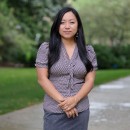Faculty News
Pages

 Michigan Social Workers Create Trauma-Informed Coloring Book
Michigan Social Workers Create Trauma-Informed Coloring BookClinical Associate Professor Julie Ribaudo, Joint PhD Student Sara Stein and the team from Zero to Thrive have created a trauma-informed coloring book for young children and their caregivers. Children may struggle to understand COVID-19. In the absence of concrete explanations, children can often imagine the worst and blame themselves for the changes they are experiencing. Georgie and the Giant Germ was developed to support caregivers in holding difficult conversations and to give children a way to express and manage their worries.
- April 14, 2020
- Learn more »
 Linda Chatters Op-Ed Urges the State of Michigan to Respond to Poverty and Racism During Pandemic
Linda Chatters Op-Ed Urges the State of Michigan to Respond to Poverty and Racism During PandemicPaula Allen-Meares Collegiate Professor of Social Work Linda Chatters and colleagues from the U-M School of Public Health recently wrote an op-ed for Bridge. "We urge the State of Michigan to recognize the role economic disinvestment and institutional racism have played in heightening the risk of COVID-19 infection."
- April 13, 2020
- Learn more »

 Joseph Himle and Addie Weaver Research on the Opioid Crisis in Rural America Referenced in The Atlantic
Joseph Himle and Addie Weaver Research on the Opioid Crisis in Rural America Referenced in The AtlanticAssociate Dean for Faculty Affairs and Howard V. Brabson Collegiate Professor Joseph Himle and Assistant Professor Addie Weaver, research “A systematic review of rural-specific barriers to medication treatment for opioid use disorder in the United States” is referenced in The Atlantic's “America’s Other Epidemic - A new approach to fighting the opioid crisis as it quietly rages on.” The drug-overdose epidemic has already killed 800,000 Americans—more than have died from AIDS—but the federal government has yet to provide adequate solutions, let alone a level of funding that could stem the crisis.
- April 10, 2020
- Learn more »
 Stimulus Checks Might Not Reach Those Who Need Them Most
Stimulus Checks Might Not Reach Those Who Need Them MostAssociate Professor Terri Friedline discusses financial system reform and consumer protections to ensure that people and communities have access to safe and affordable financial products and services during the Coronavirus Pandemic.
- April 9, 2020
- Learn more »
 Poverty Solutions with Kristin Seefeldt Publish COVID-19 Pandemic Guide
Poverty Solutions with Kristin Seefeldt Publish COVID-19 Pandemic GuideThe Michigan COVID-19 Pandemic Resource Guide, published by U-M Poverty Solutions aims to make sure the people who would benefit most from these policy changes are able to take advantage of them.
“The guide demonstrates Poverty Solutions’ commitment to action-based research that is responsive to community needs,” said Kristin Seefeldt, Poverty Solutions associate faculty director and an associate professor of social work and public policy.
- March 31, 2020
- Learn more »
 Luke Shaefer Discusses How Low-Income Families have Fewer Options During COVID-19
Luke Shaefer Discusses How Low-Income Families have Fewer Options During COVID-19Professor Luke Shaefer is quoted in a New York Times article detailing how low-income families often bear the brunt of the pain in natural disasters and large-scale emergencies. “They tend to be the first hit when things go wrong and then also to take the longest time to recover.”
- March 20, 2020
 Luke Shaefer's New Research Reveals Stark Disparities in Rural Communities
Luke Shaefer's New Research Reveals Stark Disparities in Rural CommunitiesWhere are the nation’s most disadvantaged communities? With funding from the Robert Wood Johnson Foundation, Professor Luke Shaefer, a team of researchers from U-M Poverty Solutions and Princeton University explored this question and developed an Index of Deep Disadvantage to identify and better understand America’s most disadvantaged communities. By identifying communities of deep disadvantage can help direct resources where they’re most needed.
- February 14, 2020
- Learn more »
 Brad Zeback's Research on Psychosocial Care of Young Adults with Cancer Cited in NY Times
Brad Zeback's Research on Psychosocial Care of Young Adults with Cancer Cited in NY TimesProfessor Brad Zebrack’s research was cited in the New York Times, “When the Teenager or Young Adult Has Cancer.” His research reviews psychosocial challenges, support interventions and makes recommendations for young adults with cancer.
- February 7, 2020
- Learn more »
 Joe Ryan Shares How Data Improves Outcomes for Vulnerable Children
Joe Ryan Shares How Data Improves Outcomes for Vulnerable ChildrenProfessor Joe Ryan presented his findings on how data can drive policy changes and improve outcomes for vulnerable children and families at the Wolverine Caucus. The Wolverine Caucus is a forum held in the state capital where alumni, policymakers, and the public can hear from U-M faculty experts and engage discussions on topics that impact society.
- February 3, 2020
- Learn more »
 Missing Migrants of the Mediterranean
Missing Migrants of the MediterraneanAssistant Professor Odessa Gonzalez Benson leads an action research team from U-M’s School of Social Work, School of Information, Taubman College of Urban Planning and Architecture, and Tunisia-based The Association La Terre Pour Tous who developed “Missing Migrants of the Mediterranean.” This exhibition shares stories, voices and hopes of “missing migrants” and their families, using graphic documentation and data visualization works. Through the exhibit, the team hopes to synthesize social justice, advocacy, design and technology in the form of public scholarship. "We hope to synthesize social justice and advocacy with design and technology in the form of public scholarship," stated Gonzalez Benson.
Weiser Hall Art Gallery
500 Church Street, 5th Floor
Thursday, 2/7/2020 - Wednesday, 3/25/2020- January 29, 2020